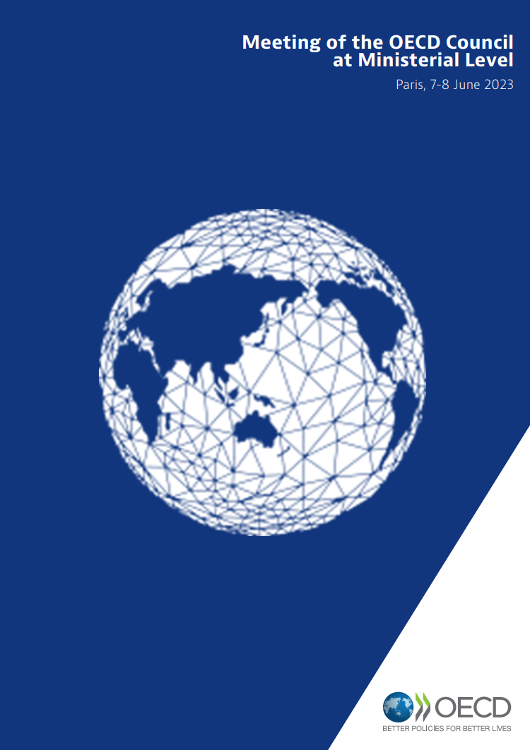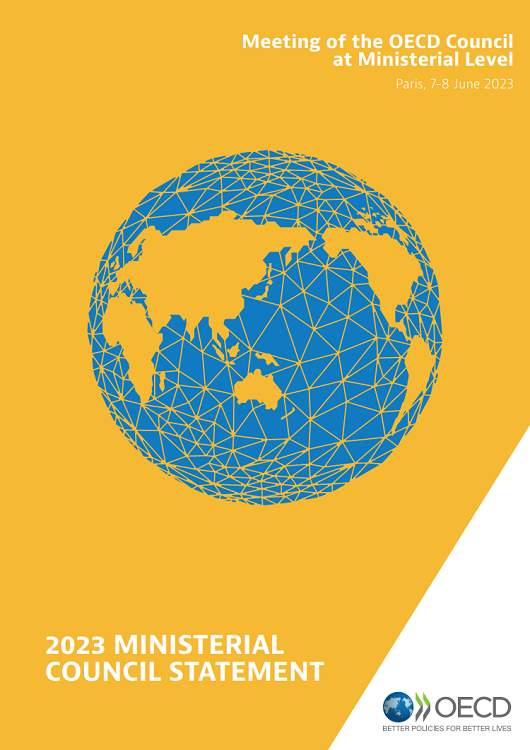Remarks by Mathias Cormann,
Secretary-General, OECD
OECD, Paris, 17 March 2022
Good morning,
Today is no ordinary presentation.
The events of the past weeks, Russia’s war against the people of Ukraine and the pain and suffering it is causing, are deeply distressing to watch unfold.
The OECD Council has condemned Russia’s large-scale aggression against Ukraine in the strongest possible terms.
We stand in strong solidarity with the people and the democratically elected government of Ukraine.
People in Ukraine are on the frontline of a war in defence of freedom and democracy.
The price the people of Ukraine are paying to defend their country and our way of life goes well beyond economics.
The pain and suffering.
The lives lost.
The homes destroyed.
The families torn apart.
The huge numbers of displaced people.
This war is an attack against everything we stand for.
It is first and foremost a terrible, massive humanitarian crisis inflicted on the people of Ukraine.
It is a statement of the obvious to say that, globally, this threat to the international rules-based order adds significant further uncertainty to the economic outlook.
That is why, in the circumstances, we are not in a position to present the usual OECD Interim Economic Outlook at this time.
Which is why we have decided at this point, to provide an assessment of some of the potential global economic and social impacts and policy implications instead.
Our Chief Economist and Deputy Secretary-General Laurence Boone will present the details of our analysis, but let me first focus on what we see as some of the key pressing economic and social challenges we see and some key points of response.
First, on the humanitarian crisis caused by this war.
To date, about 3 million people have left Ukraine in the wake of this war.
To escape from the conflict and the violence, but also due to shortages in power, fuel and food and other important supplies.
While the war continues, millions more will follow.
Europe and other OECD countries will need to continue to welcome and integrate a large number of refugees from Ukraine.
The genuine solidarity, generosity and goodwill, to help and support refugees from Ukraine, has been heart-warming to watch. In particular in Poland, but also right across Europe and other parts of the world.
This is unlikely to be a short term challenge.
We need to prepare ourselves to sustain that humanitarian support to a significantly higher number of people fleeing Ukraine and most probably over an extended period.
Across the EU there will be a need to find pragmatic ways to appropriately share the burden.
Importantly, beyond the Ukraine, this war risks causing a negative humanitarian impact in other parts of the world.
Developing and emerging market economies will be particularly heavily impacted by higher food prices, as the share of the population who will be unable to afford food at higher prices and is at risk of malnutrition is higher than in advanced economies.
It will be important for those countries to avoid measures that reduce the incentives for domestic producers such as price caps and to avoid measures that would contribute to even higher international prices such as export taxes.
Second, even though Russia and Ukraine are a comparatively small part of the global economy, the economic disruptions brought on by the conflict are large and are likely to continue in the future.
In response to the war waged by the Putin administration against the people of Ukraine, many countries, appropriately and importantly, have introduced unprecedented sanctions on Russia.
The aim of those sanctions is to maximise pressure on Russia while causing minimal disruption in the countries introducing them.
While impacts in different countries in different parts of the world will vary, but clearly there will be disruptions and there will be costs.
The war is causing a strong supply shock, which adds to inflationary pressures and disruptions already caused by the COVID-19 crisis.
There is the significant negative impact on confidence, which in turn will negatively impact private consumption and business investment decisions.
There is the developing impact on energy and commodity supplies as well as disruptions to international trade and financial markets.
The overall trade and direct investment links of OECD economies with Russia are rather limited.
Together, Ukraine and Russia represent less than 3% of the global trade flows and hold less than 2% of the total global Foreign Direct Investment stock.
However, some countries and sectors are relatively more exposed.
This commodity supply squeeze resulting from the conflict, which is exacerbating supply chain disruptions brought on by the pandemic, risks weighing on consumers and firms for a long time.
Russia and Ukraine together account for about a third of global wheat exports and are major producers of fertilizers. They are also a critical source of some metals and minerals such as nickel, titanium and palladium.
These goods are key for many supply chains, including those needed for the green transition.
Laurence will provide more details on the impact on commodity prices.
In terms of the policy and market response.
We need to remain cool-headed.
We need both sensible near-term and sensible longer-term action.
Given available global supplies for some commodities such as wheat, the extent of the current price spikes do not appear to reflect real supply shortages.
It is essential that we keep markets open and operating freely in order to stabilise prices and ensure existing supplies reach those places where they are most needed.
For both agricultural commodities, as well as metals and minerals, we should keep our long term objectives in sight.
This means reducing the longer-term dependency on Russian cereal exports through increasing production and ensuring productivity growth, including by facilitating the trade of essential inputs for production.
For metals and minerals, known reserves exist outside Russia and can be put into production when the business case is right.
Thirdly, the impact on energy markets and prices is particularly acute.
The global economy is now experiencing a massive energy price shock.
Brent oil prices have jumped, reaching briefly 139 dollars per barrel last week, the highest price since 2014, and European gas prices have soared.
Many EU countries rely heavily on Russia for their energy supply.
27% of EU crude oil imports, 41% of natural gas imports and 47% of solid fuel imports come from Russia.
Currently, gas storage levels are low and the availability of additional Liquefied Natural Gas is limited.
As with commodities, this requires both immediate and longer-term policy responses, particularly in Europe.
Most European countries have responded rapidly, with immediate demand-side, and in some cases supply-side, measures.
More will be needed.
Looking ahead, while large-scale substitution of oil and gas may not be feasible in the very short term, there are ways to reduce dependency over time in a way that also aligns with existing climate goals.
In the current acute context, Europe in particular, needs to rise to the occasion and reassess the most appropriate market structure and design to ensure energy security and affordability while remaining focused on achieving carbon neutrality by 2050.
The International Energy Agency (IEA) has produced a detailed 10-point plan to reduce the European Union’s reliance on Russian natural gas.
Tomorrow it will publish a similar plan on oil.
As it will take years to fully offset this reliance and reinforce energy security in Europe, action should start now.
To re-enforce a previous point again - In the extreme circumstances faced by the European energy market, I would strongly encourage an open-minded re-examination of current policy settings, including a reassessment of the most appropriate market structure and design to ensure energy security and affordability, while remaining on track to meet climate objectives.
In the meantime, during the transition, energy and food prices will add further to already elevated inflation.
Anchoring expectations will be important.
This crisis calls for sensible, well targeted, temporary short term measures while staying focused on long-term objectives, ensuring the resilience of our global supply chains, ensuring energy, food and digital security, and staying the course on our climate objectives.
Structural measures such as diversifying input sources, enhancing investment and productivity, and reinforcing rules-based trade will be more important and urgent than ever.
Finally, in closing, while taking all the necessary and appropriate steps to mitigate the many challenges and risks caused by this war, we should also plan now how we can best support the democratically elected government in Ukraine with their rebuilding and reconstruction effort on the other side.
The people of Ukraine and their leaders have inspired us with their courage, their bravery and their tenacity. There are many difficult days and weeks ahead of them. Let’s hope that the opportunity to start the rebuilding and reconstruction effort comes sooner rather than later.
The OECD stands ready to play its part.
I will now pass the floor to Laurence to deliver the details on our analysis.
Thank you.

